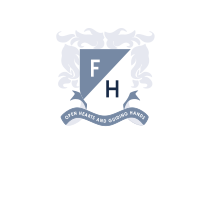Curriculum
You can find below all aspects of the Finton House School curriculum.
Throughout the curriculum and in the wide range of clubs and extra activities available to the pupils at Finton House, the pupils learn a great deal of what are traditionally seen as cultural pursuits – literature, theatre, art, music, language etc. All curriculum areas have a contribution to make to the pupils’ spiritual, moral, social and cultural development (SMSC) and opportunities for this are planned in each area of the curriculum.
We aim to create a successful learning culture, which will enable the children to become informed, confident, enthusiastic and independent learners.
Art & Design
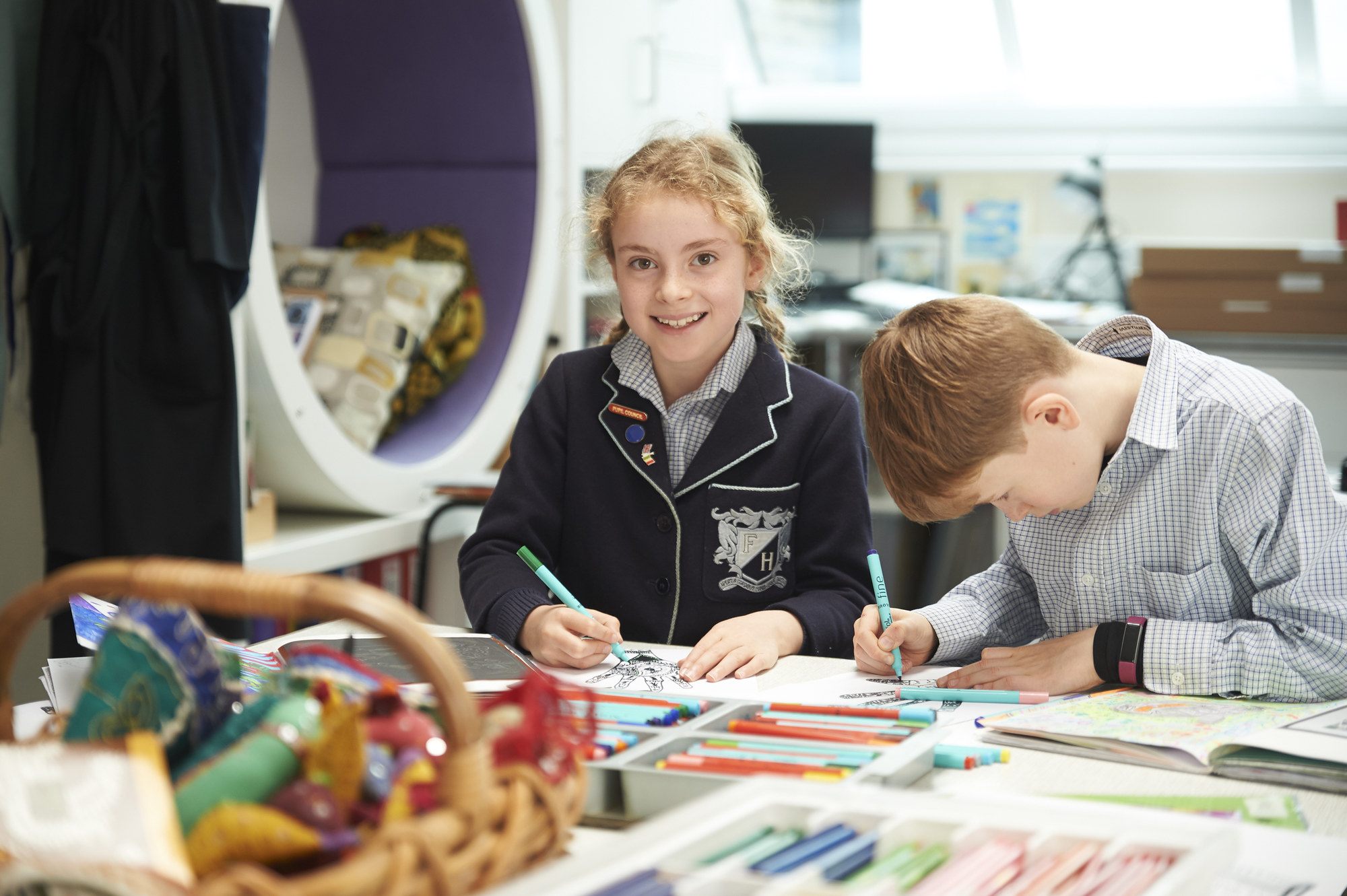
Art & Design
Make your mark! – Observe Sketch Doodle – Enjoy the process – Embrace happy accidents – Follow your instinct… Explore and dare!
The Art Department at Finton House is a lively, exciting and creative space. We are proud of our customised art room which incorporates a broad range of materials and resources, as well as some unique features.
We bridge the gap between art in school and art in life by encouraging pupils to see the subject both as an intellectual and creative pursuit. Our specialist art teachers are highly trained in drawing, painting, printmaking, textiles and 3D crafts. They are practising artists, who love to share with the children their knowledge and top tips.
At Finton House, in nurturing a passion for creativity, we help children develop the confidence to express themselves, be intuitive, appreciate different cultures, take risks and become visually literate. Quentin Blake said, “Art is not just a subject to learn, but an activity that you can practice with your hands, your eyes, your whole personality.” We agree!
Computing
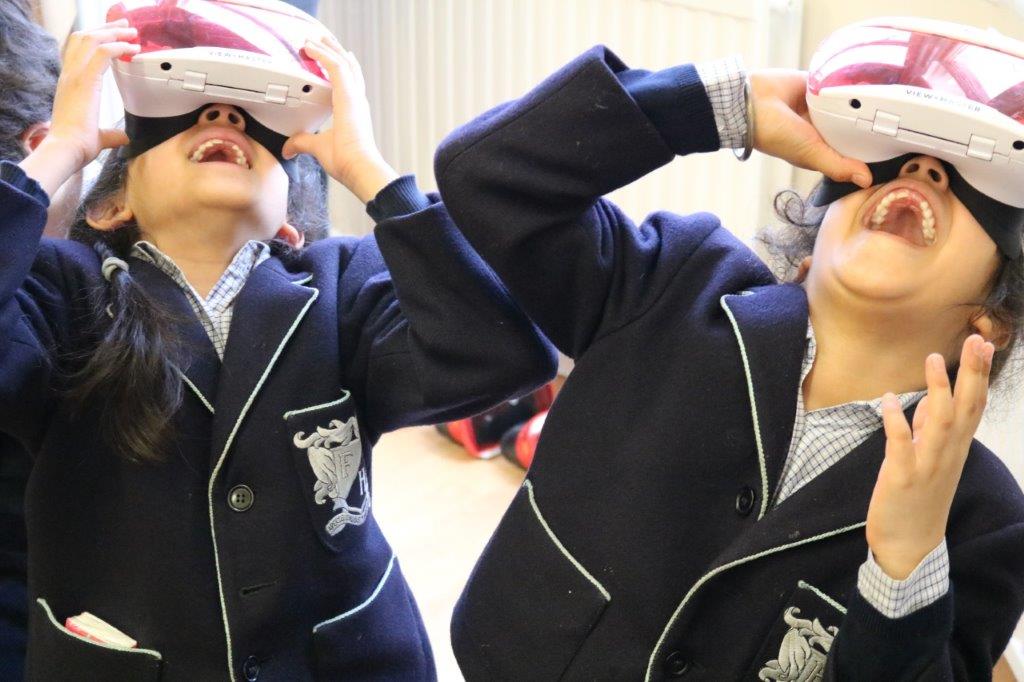
Computing
Exploration and excitement are the key attributes to Computing lessons at Finton House. Our children love the prospect of learning about and exploring technological devices – from using iPads, programming robots and designing computer games to creating websites.
We take E-Safety very seriously and it forms an integral part of the curriculum. From Reception all children are taught safety strategies through songs and stories. As the children progress, they enhance their understanding through interactive programs and workshops on how to protect their personal information and keep themselves safe online.
Programming and coding form an important part of the curriculum and the children explore different types of programming languages through a range of activities and topics.
A good grounding in all Microsoft applications, together with structured typing lessons which start in Year 3, give our children the necessary skills to use information technology as a tool for learning and creativity across Finton’s diverse curriculum.
Critical Thinking
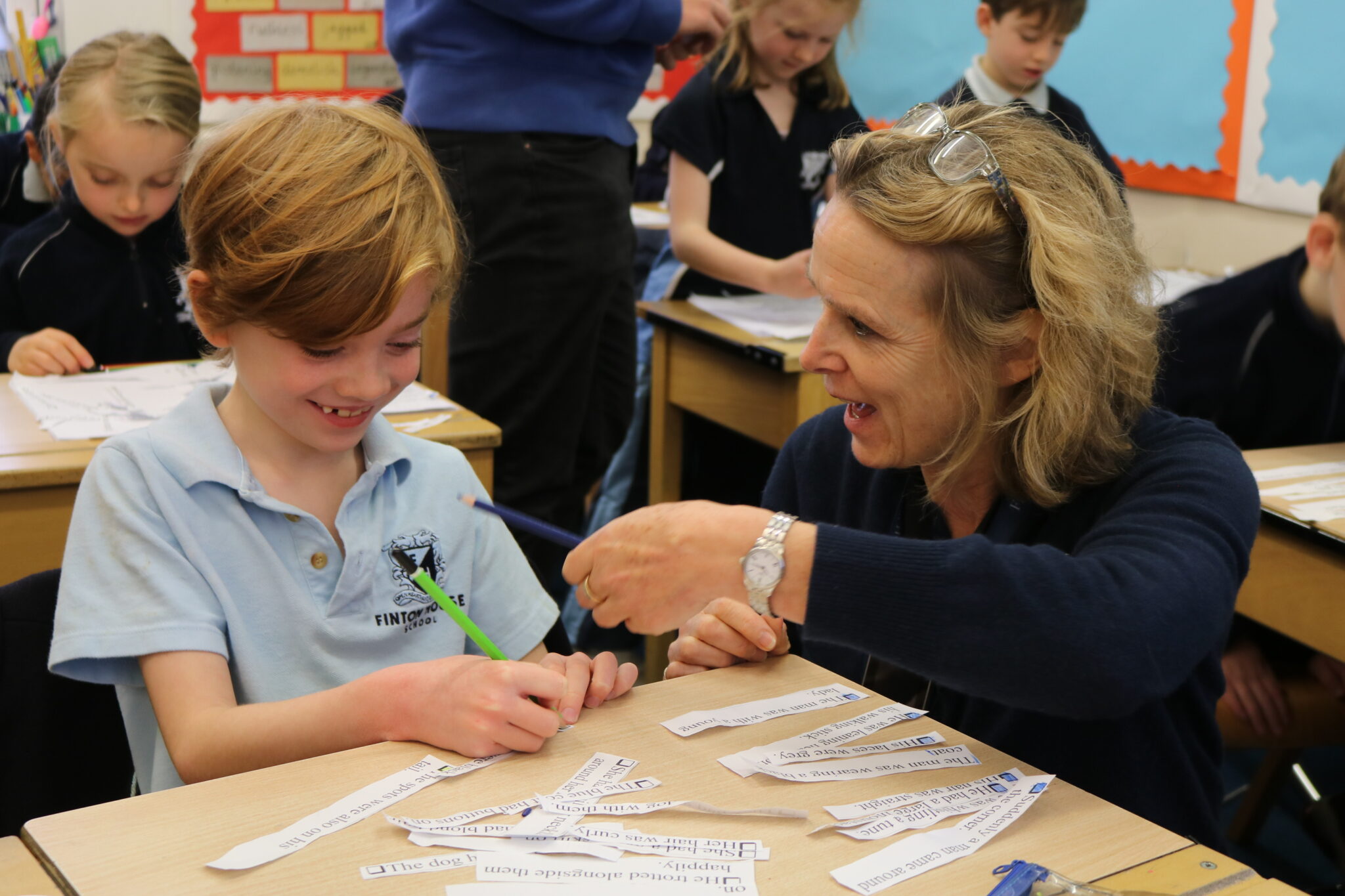
Critical Thinking
Critical Thinking sessions with Years 4, 5 and 6 are always lively and usually rather noisy!
Each week thought-provoking questions and issues are explored, and the children are encouraged to share and reflect upon their ideas and opinions. They learn the value of being able to think ‘on their feet’ and ‘outside the box’ and the importance of being able to give reasons to support their answers. Curiosity is encouraged, as is careful listening to each other.
Sometimes the topics discussed are humorous, for example would a giraffe or an elephant make a better teacher? At other times, more serious issues are explored and debated, such as whether money is the best form of foreign aid. Whatever the focus, the questions are always engaging and with one question often leading to another, the children quickly realise that even those which look straightforward don’t necessarily have an easy answer. As a result, the thinking and discussion always continues long after the session has ended!
A few questions to whet your appetite:
- Is a library without any books still a library?
- Is it possible to predict the future?
- Would you rather be really happy for a short time or a little happy for a long time?
- Would the world be fairer if all jobs paid the same?
- Can it ever be wrong to forgive?

Art & Design
Make your mark! – Observe Sketch Doodle – Enjoy the process – Embrace happy accidents – Follow your instinct… Explore and dare!
The Art Department at Finton House is a lively, exciting and creative space. We are proud of our customised art room which incorporates a broad range of materials and resources, as well as some unique features.
We bridge the gap between art in school and art in life by encouraging pupils to see the subject both as an intellectual and creative pursuit. Our specialist art teachers are highly trained in drawing, painting, printmaking, textiles and 3D crafts. They are practising artists, who love to share with the children their knowledge and top tips.
At Finton House, in nurturing a passion for creativity, we help children develop the confidence to express themselves, be intuitive, appreciate different cultures, take risks and become visually literate. Quentin Blake said, “Art is not just a subject to learn, but an activity that you can practice with your hands, your eyes, your whole personality.” We agree!

Computing
Exploration and excitement are the key attributes to Computing lessons at Finton House. Our children love the prospect of learning about and exploring technological devices – from using iPads, programming robots and designing computer games to creating websites.
We take E-Safety very seriously and it forms an integral part of the curriculum. From Reception all children are taught safety strategies through songs and stories. As the children progress, they enhance their understanding through interactive programs and workshops on how to protect their personal information and keep themselves safe online.
Programming and coding form an important part of the curriculum and the children explore different types of programming languages through a range of activities and topics.
A good grounding in all Microsoft applications, together with structured typing lessons which start in Year 3, give our children the necessary skills to use information technology as a tool for learning and creativity across Finton’s diverse curriculum.

Critical Thinking
Critical Thinking sessions with Years 4, 5 and 6 are always lively and usually rather noisy!
Each week thought-provoking questions and issues are explored, and the children are encouraged to share and reflect upon their ideas and opinions. They learn the value of being able to think ‘on their feet’ and ‘outside the box’ and the importance of being able to give reasons to support their answers. Curiosity is encouraged, as is careful listening to each other.
Sometimes the topics discussed are humorous, for example would a giraffe or an elephant make a better teacher? At other times, more serious issues are explored and debated, such as whether money is the best form of foreign aid. Whatever the focus, the questions are always engaging and with one question often leading to another, the children quickly realise that even those which look straightforward don’t necessarily have an easy answer. As a result, the thinking and discussion always continues long after the session has ended!
A few questions to whet your appetite:
- Is a library without any books still a library?
- Is it possible to predict the future?
- Would you rather be really happy for a short time or a little happy for a long time?
- Would the world be fairer if all jobs paid the same?
- Can it ever be wrong to forgive?
Design & Technology
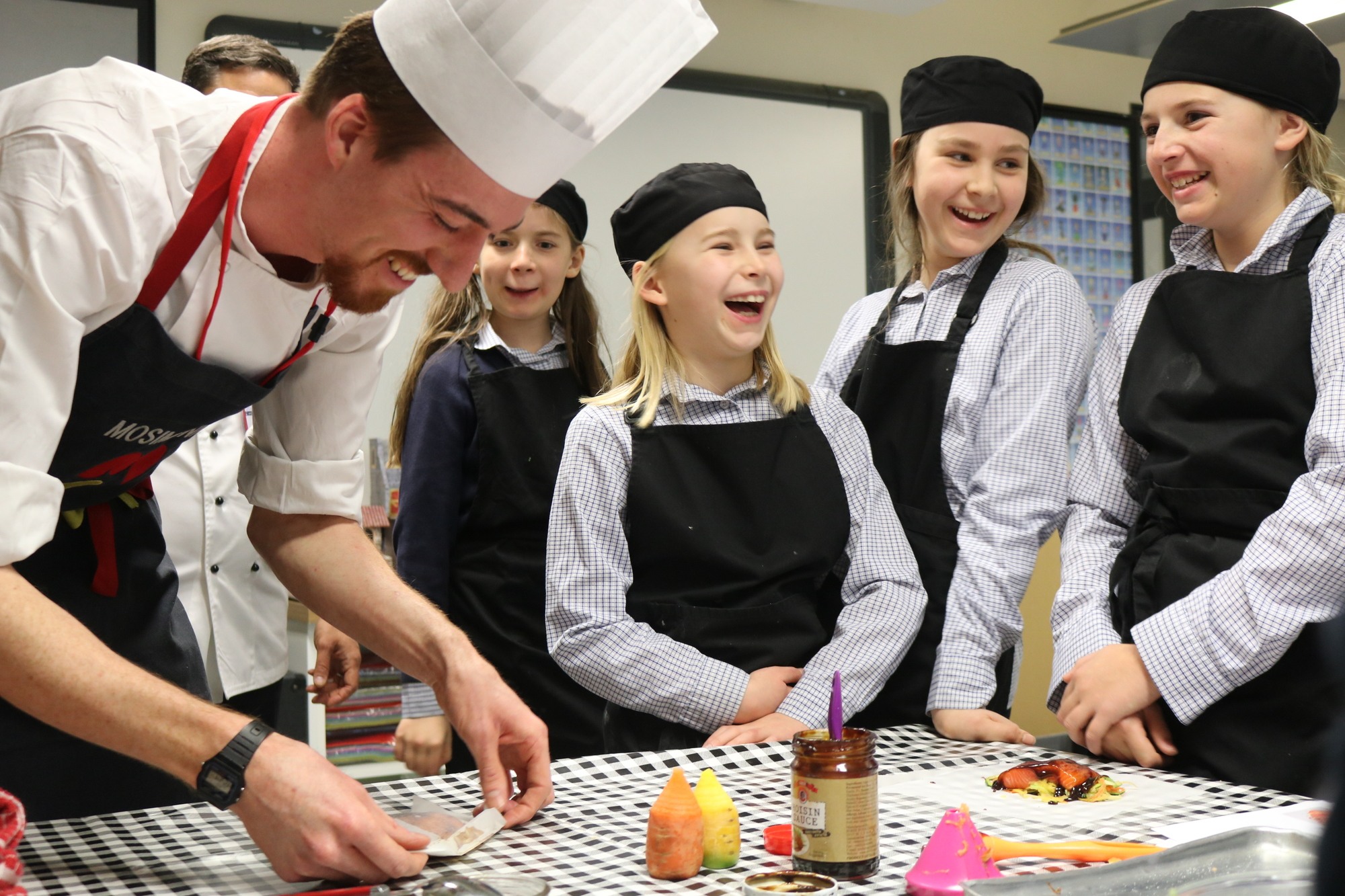
Design & Technology
All children in Year 1 and above attend lessons in Miss Debi’s DT workshop once a week. They are taught a wide range of practical skills and they design and build some very impressive models. In lessons, the focus is on encouraging the children to think independently and make their own decisions.
By using a saw and a drill, working with e-textiles, constructing electronic circuits and using computer-aided design programs, the children become designing and building experts, and confidently take on challenging projects such as constructing a working windmill using a joule thief.
Life skills such as communication, problem solving and cooking delicious and nutritious meals are developed through the Design & Technology curriculum. By the time the children leave us to go on to their next schools, they have amassed a range of skills and techniques which will give them a head start in their DT / STEM careers. They have also had a lot of fun!
Drama & Productions
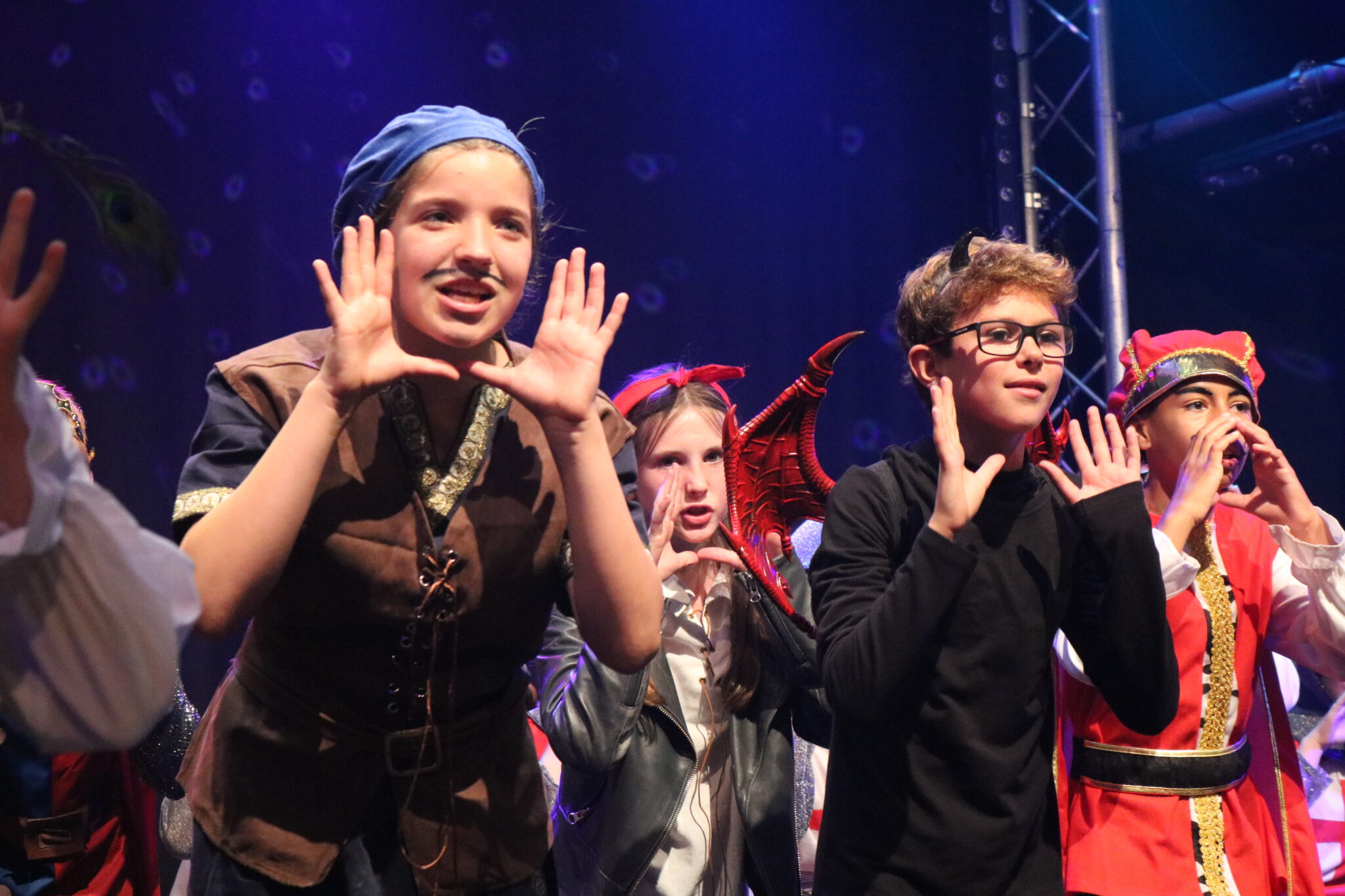
Drama & Productions
At Finton House, drama is taught in every year group, both as its own subject and as an integral part of English lessons. Our annual Poetry Week gives every child the opportunity to take part in poetry recitals which build confidence and develop performance skills. Each year children perform in plays, class assemblies and whole year group productions at local venues. The Year 2 and Year 6 plays, filled with delightful musical numbers, showcases the confidence, skill and enthusiasm of pupils across the school, and each year’s production seems more amazing than the last.
Even the staff have the opportunity to show off their amateur dramatics during the staff pantomime at Christmas, although this is only for the eyes of the children and teachers!
English
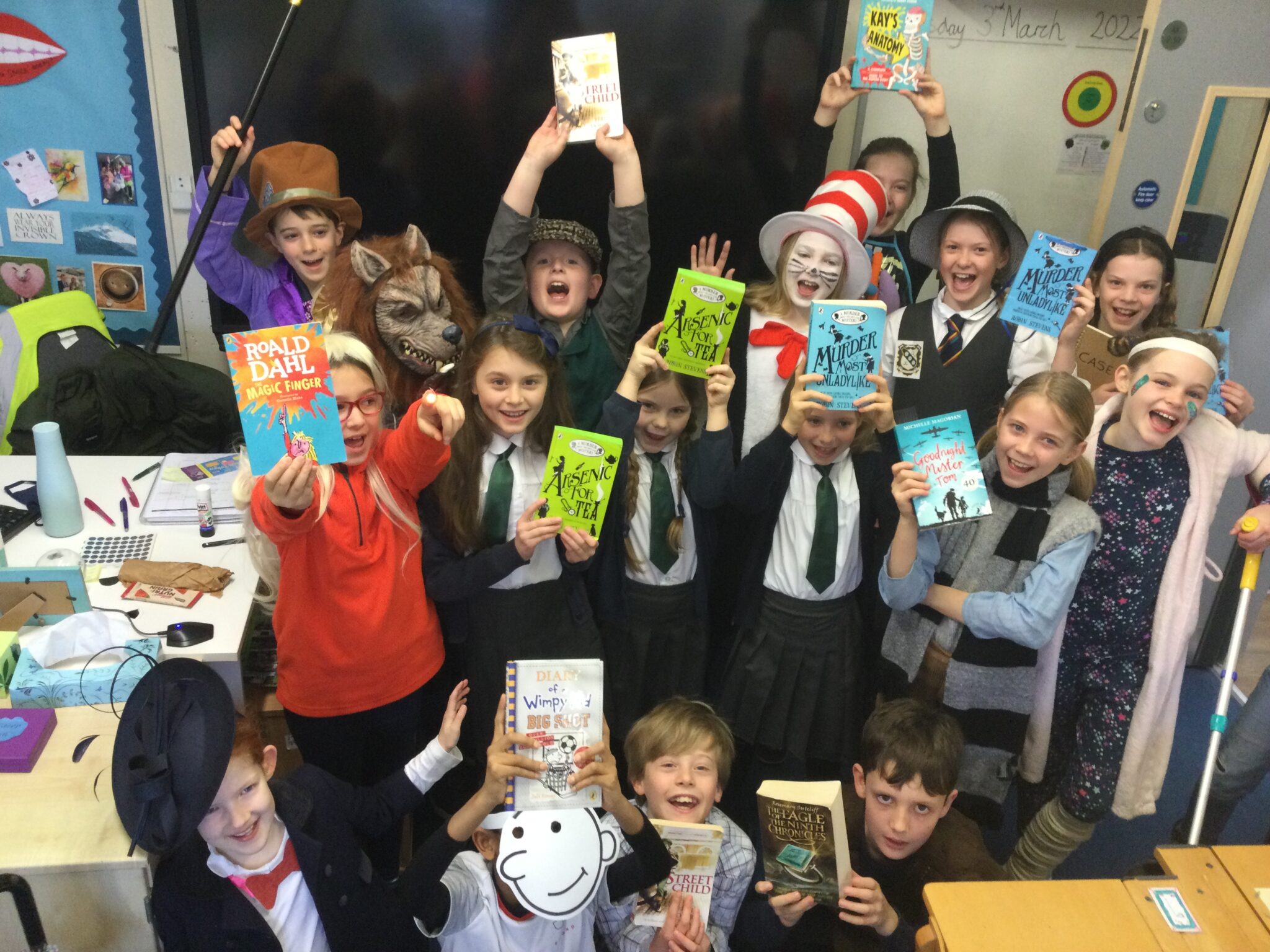
English
Our aim is to inspire and enable children far beyond the boundaries of their English lessons, to become creative thinkers, speakers and writers right across the curriculum. Children are therefore being taught, whatever their age or ability, how to communicate and express themselves confidently through the written and spoken word, all day and every day, in all areas of school life.
Throughout the year, numerous additional opportunities are planned to enrich the children’s experience- from visiting authors and poets, to whole school poetry recitals, book days, balloon debates, theatre visits and drama productions. Clubs before and after school foster a love of English and drama and the library is always abuzz at the heart of the school.
From the emergent writers in Reception, to the Common Entrance (11+) Scholarship pupils in Year 6, our expectations for literacy levels are extremely high – as too, is the standard of work which the children consistently produce.

Design & Technology
All children in Year 1 and above attend lessons in Miss Debi’s DT workshop once a week. They are taught a wide range of practical skills and they design and build some very impressive models. In lessons, the focus is on encouraging the children to think independently and make their own decisions.
By using a saw and a drill, working with e-textiles, constructing electronic circuits and using computer-aided design programs, the children become designing and building experts, and confidently take on challenging projects such as constructing a working windmill using a joule thief.
Life skills such as communication, problem solving and cooking delicious and nutritious meals are developed through the Design & Technology curriculum. By the time the children leave us to go on to their next schools, they have amassed a range of skills and techniques which will give them a head start in their DT / STEM careers. They have also had a lot of fun!

Drama & Productions
At Finton House, drama is taught in every year group, both as its own subject and as an integral part of English lessons. Our annual Poetry Week gives every child the opportunity to take part in poetry recitals which build confidence and develop performance skills. Each year children perform in plays, class assemblies and whole year group productions at local venues. The Year 2 and Year 6 plays, filled with delightful musical numbers, showcases the confidence, skill and enthusiasm of pupils across the school, and each year’s production seems more amazing than the last.
Even the staff have the opportunity to show off their amateur dramatics during the staff pantomime at Christmas, although this is only for the eyes of the children and teachers!

English
Our aim is to inspire and enable children far beyond the boundaries of their English lessons, to become creative thinkers, speakers and writers right across the curriculum. Children are therefore being taught, whatever their age or ability, how to communicate and express themselves confidently through the written and spoken word, all day and every day, in all areas of school life.
Throughout the year, numerous additional opportunities are planned to enrich the children’s experience- from visiting authors and poets, to whole school poetry recitals, book days, balloon debates, theatre visits and drama productions. Clubs before and after school foster a love of English and drama and the library is always abuzz at the heart of the school.
From the emergent writers in Reception, to the Common Entrance (11+) Scholarship pupils in Year 6, our expectations for literacy levels are extremely high – as too, is the standard of work which the children consistently produce.
Games & PE
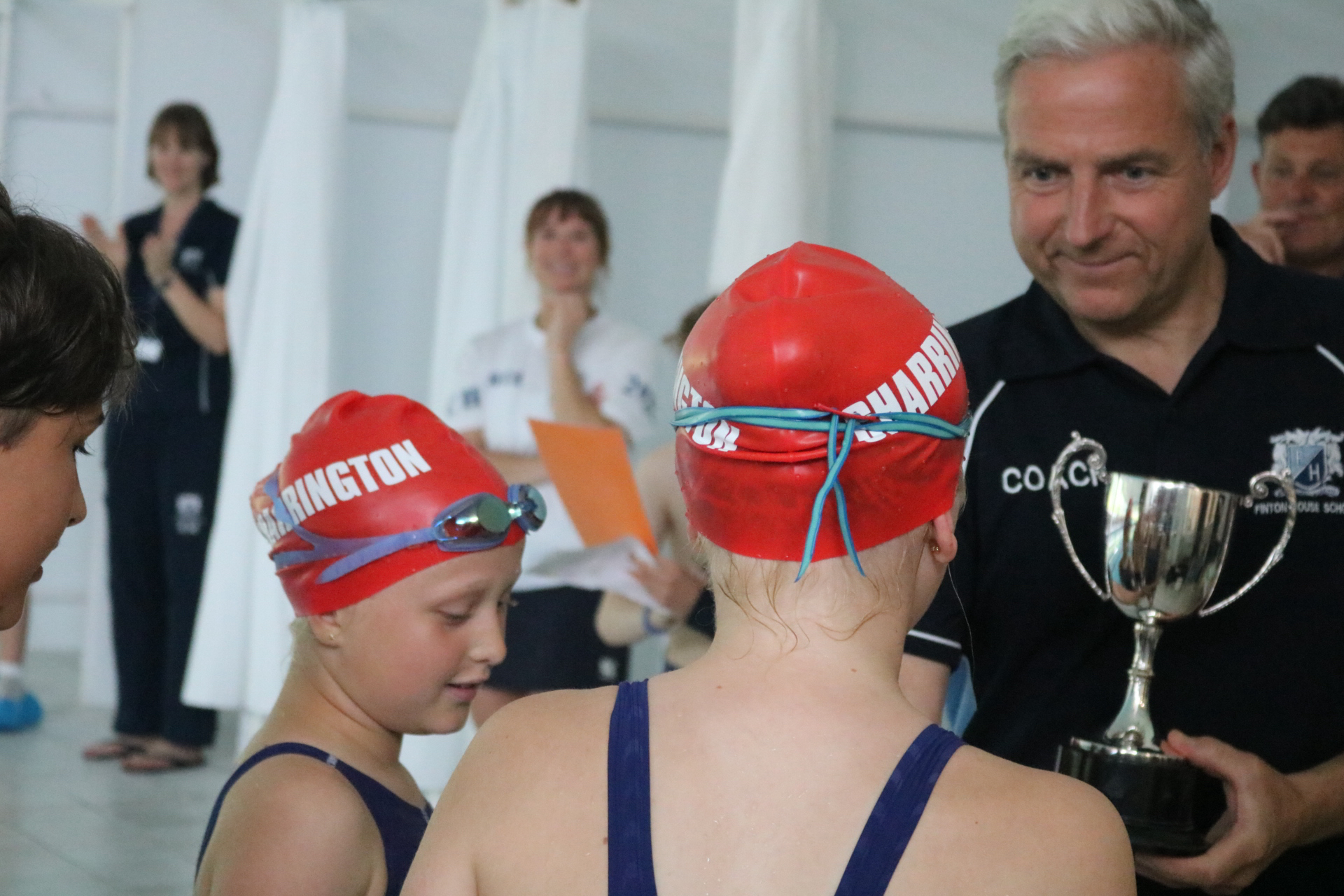
Games & PE
At Finton House we believe that Physical Education is essential to the development of the whole child: academic, social, emotional, spiritual and physical. It provides the opportunity to promote self-esteem and confidence helping children build character strengths including perseverance, resilience, teamwork and leadership.
Finton House is committed to ensuring that all children, regardless of ability, have the opportunity to participate in a range of individual and team sports. The curriculum is planned to ensure that each child receives a well-structured progressive programme of physical activity, and children in Years 2-6 participate in a minimum of five inter-school fixtures per term. Encouraging the children to strive for excellence and win and lose with good grace is at the heart of the school’s philosophy.
Swimming is a key feature of the P.E. programme. All children from Reception to Year 4 have regular weekly swimming lessons. They are taught in small groups by our qualified and dedicated staff. The school has a very successful swimming team which competes against many top schools in London. Every year we take a team to the English Schools National Relay Finals in Sheffield.
Geography
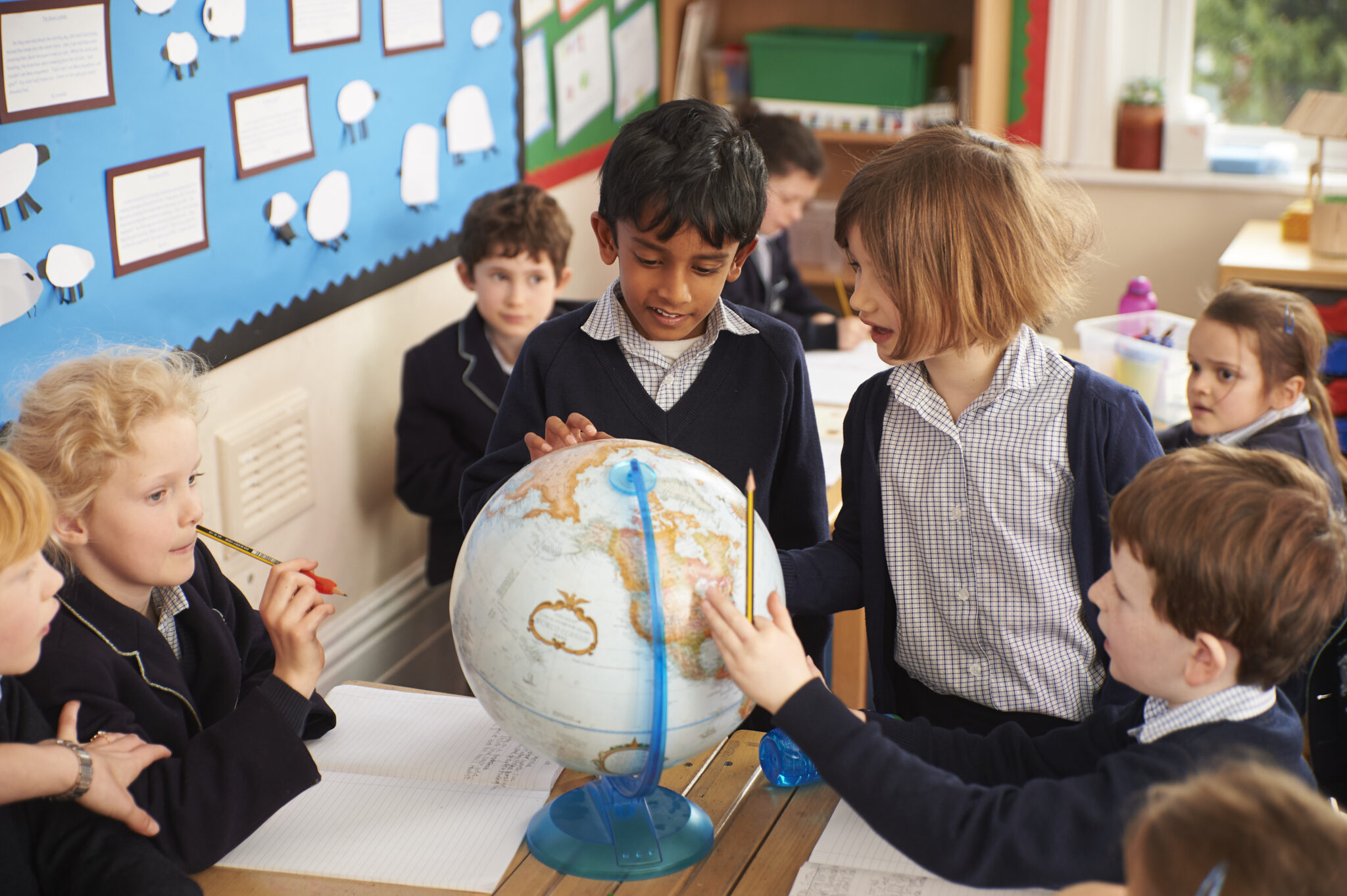
Geography
At Finton our children develop a life-long love of geography, through enquiry-based teaching and learning inside the classroom and further afield. Our children enjoy exploring the world and putting their learnt skills into practice through hands-on field work, residential trips and virtual reality workshops.
As the children journey through the school their knowledge of the world is expanded through studies of different countries, people, environments and global issues. Children develop the skills to compare and contrast their own lives with those of others around the world.
Highlights include:
- Orienteering in Wales
- In house Digi-map and weather station technology
- Berol our adopted orang-utan bringing sustainability issues to life
- Pen pals with our sponsored pupils at Green Pastures School Kenya
- ‘Travelling around the world’ with Barnaby Bear
We aim to develop ‘outside the box’ thinkers, whose knowledge is not just curriculum or class based but has strong links to current affairs and global issues. We feel it is essential that children understand how much geography impacts their lives.
History
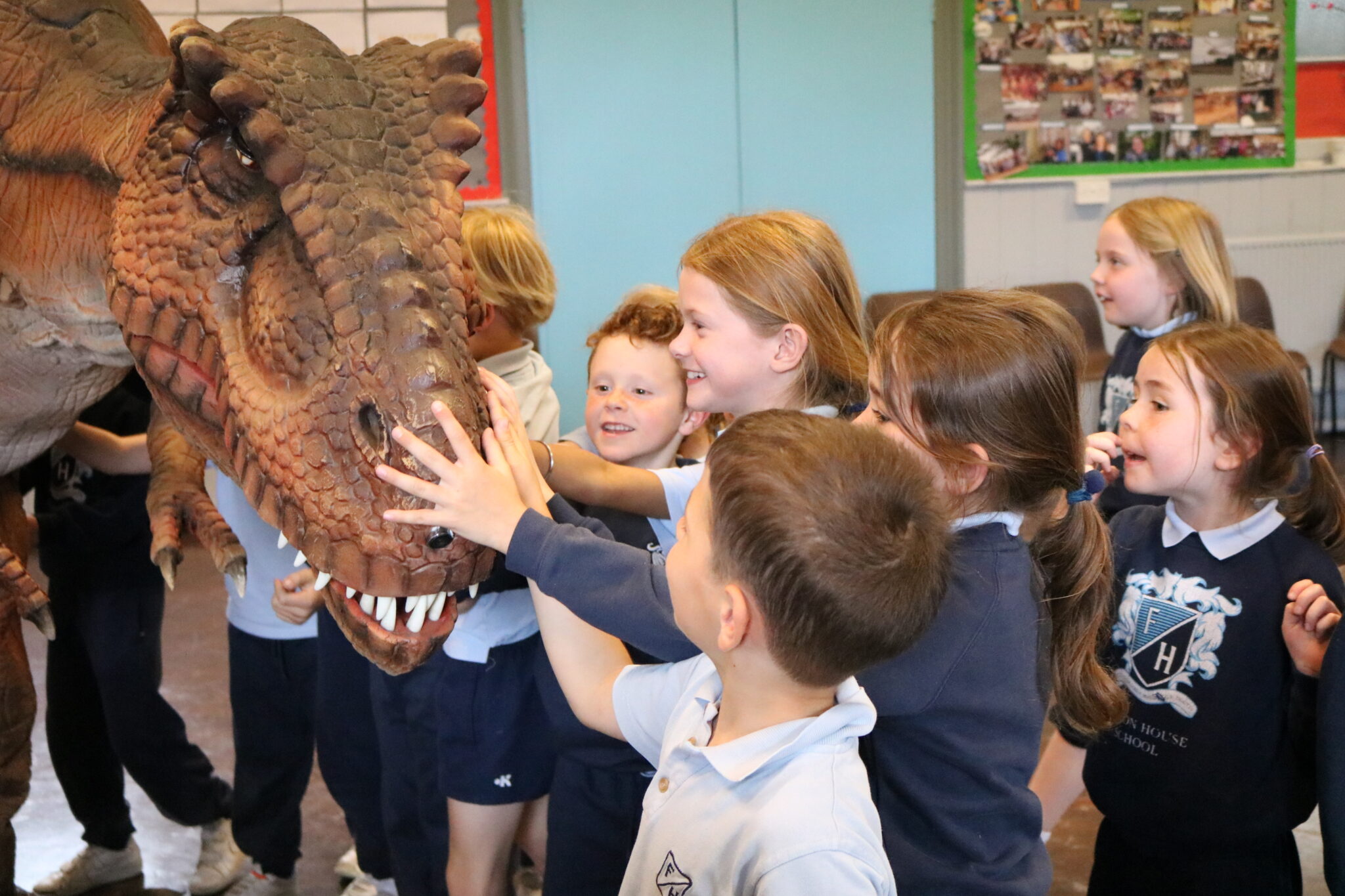
History
At Finton we endeavour to excite the children’s interest in the past. Through history, young children can begin to learn and understand something about the actions and beliefs of people in the past and the influence these have had in shaping the present. It is through learning about the past that children begin to understand the present and the effect their actions will have on the future.
Through workshops, trips, active and inspirational lessons we aim to:
- develop an interest in the past, a sense of empathy and an appreciation of human achievements and aspirations.
- develop a sense of chronology, within which the children can organise their understanding of the past.
- gain historical perspective by placing the children’s growing knowledge into different contexts; understanding the connections between local, regional, national and international history; between cultural, economic, political, religious and social history; and between short- and long-term time-scales.
By the end of their time at Finton we would hope that our children have developed an understanding of the history of these islands as a coherent, chronological narrative, from the earliest times to the present day; how people’s lives have shaped this nation and how Britain has influenced and been influenced by the wider world.

Games & PE
At Finton House we believe that Physical Education is essential to the development of the whole child: academic, social, emotional, spiritual and physical. It provides the opportunity to promote self-esteem and confidence helping children build character strengths including perseverance, resilience, teamwork and leadership.
Finton House is committed to ensuring that all children, regardless of ability, have the opportunity to participate in a range of individual and team sports. The curriculum is planned to ensure that each child receives a well-structured progressive programme of physical activity, and children in Years 2-6 participate in a minimum of five inter-school fixtures per term. Encouraging the children to strive for excellence and win and lose with good grace is at the heart of the school’s philosophy.
Swimming is a key feature of the P.E. programme. All children from Reception to Year 4 have regular weekly swimming lessons. They are taught in small groups by our qualified and dedicated staff. The school has a very successful swimming team which competes against many top schools in London. Every year we take a team to the English Schools National Relay Finals in Sheffield.

Geography
At Finton our children develop a life-long love of geography, through enquiry-based teaching and learning inside the classroom and further afield. Our children enjoy exploring the world and putting their learnt skills into practice through hands-on field work, residential trips and virtual reality workshops.
As the children journey through the school their knowledge of the world is expanded through studies of different countries, people, environments and global issues. Children develop the skills to compare and contrast their own lives with those of others around the world.
Highlights include:
- Orienteering in Wales
- In house Digi-map and weather station technology
- Berol our adopted orang-utan bringing sustainability issues to life
- Pen pals with our sponsored pupils at Green Pastures School Kenya
- ‘Travelling around the world’ with Barnaby Bear
We aim to develop ‘outside the box’ thinkers, whose knowledge is not just curriculum or class based but has strong links to current affairs and global issues. We feel it is essential that children understand how much geography impacts their lives.

History
At Finton we endeavour to excite the children’s interest in the past. Through history, young children can begin to learn and understand something about the actions and beliefs of people in the past and the influence these have had in shaping the present. It is through learning about the past that children begin to understand the present and the effect their actions will have on the future.
Through workshops, trips, active and inspirational lessons we aim to:
- develop an interest in the past, a sense of empathy and an appreciation of human achievements and aspirations.
- develop a sense of chronology, within which the children can organise their understanding of the past.
- gain historical perspective by placing the children’s growing knowledge into different contexts; understanding the connections between local, regional, national and international history; between cultural, economic, political, religious and social history; and between short- and long-term time-scales.
By the end of their time at Finton we would hope that our children have developed an understanding of the history of these islands as a coherent, chronological narrative, from the earliest times to the present day; how people’s lives have shaped this nation and how Britain has influenced and been influenced by the wider world.
Languages
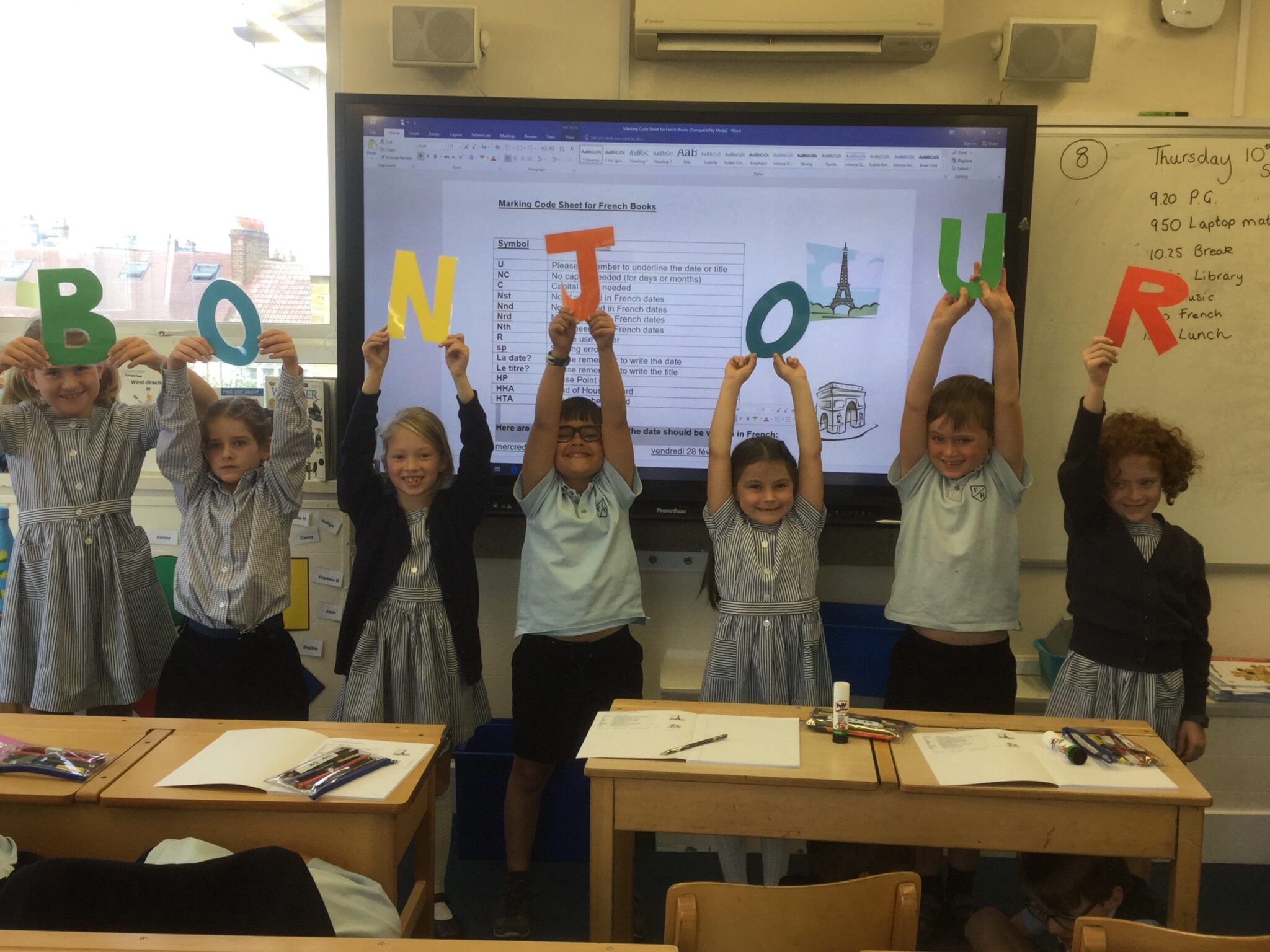
Languages
Pupils are taught French from Reception to Year 6 by our Head of Languages, Madame Zoe. In addition, Year 6 pupils are introduced to Spanish and Latin in their final two terms at Finton. Throughout the school, language teaching focuses on building children’s innate curiosity about the world around them, preparing them for secondary school and equipping them to communicate with confidence in a foreign language.
There is a clear emphasis on enjoyment and participation. Children develop the four skills of speaking, listening, reading and writing, through the use of puppets, rhymes, songs, role-plays, traditional stories and interactive websites.
We enhance our language learning in many ways at Finton House: weekly language clubs take place for more able or bilingual pupils; theatre companies visit the school; Year 6 have a French Day; we have an International Day celebrating all of the cultures across the school and our Year 6 pupils go to Normandy for 5 days in their summer term, where they are fully immersed in French language, history and culture.
Maths

Maths
At Finton we aim to foster curiosity and enjoyment of mathematics and develop the children’s mathematical fluency, reasoning and ability to solve problems. Encouragement and the development of investigative thinking skills brings maths to life in the classroom and builds the children’s confidence.
Children excel where expectations are high and children at Finton consistently achieve to the best of their ability in Maths. Those that struggle are supported and nurtured, whilst those with a natural aptitude for mathematics are challenged to stretch their understanding through differentiated lessons and workshops.
Through engaging and practical lessons, we make mathematics interesting, creative and fun. We promote a growth mind-set attitude towards mathematics by encouraging children to take risks and make mistakes in order to deepen their knowledge. This way they learn that challenge can be rewarding and satisfying.
Music
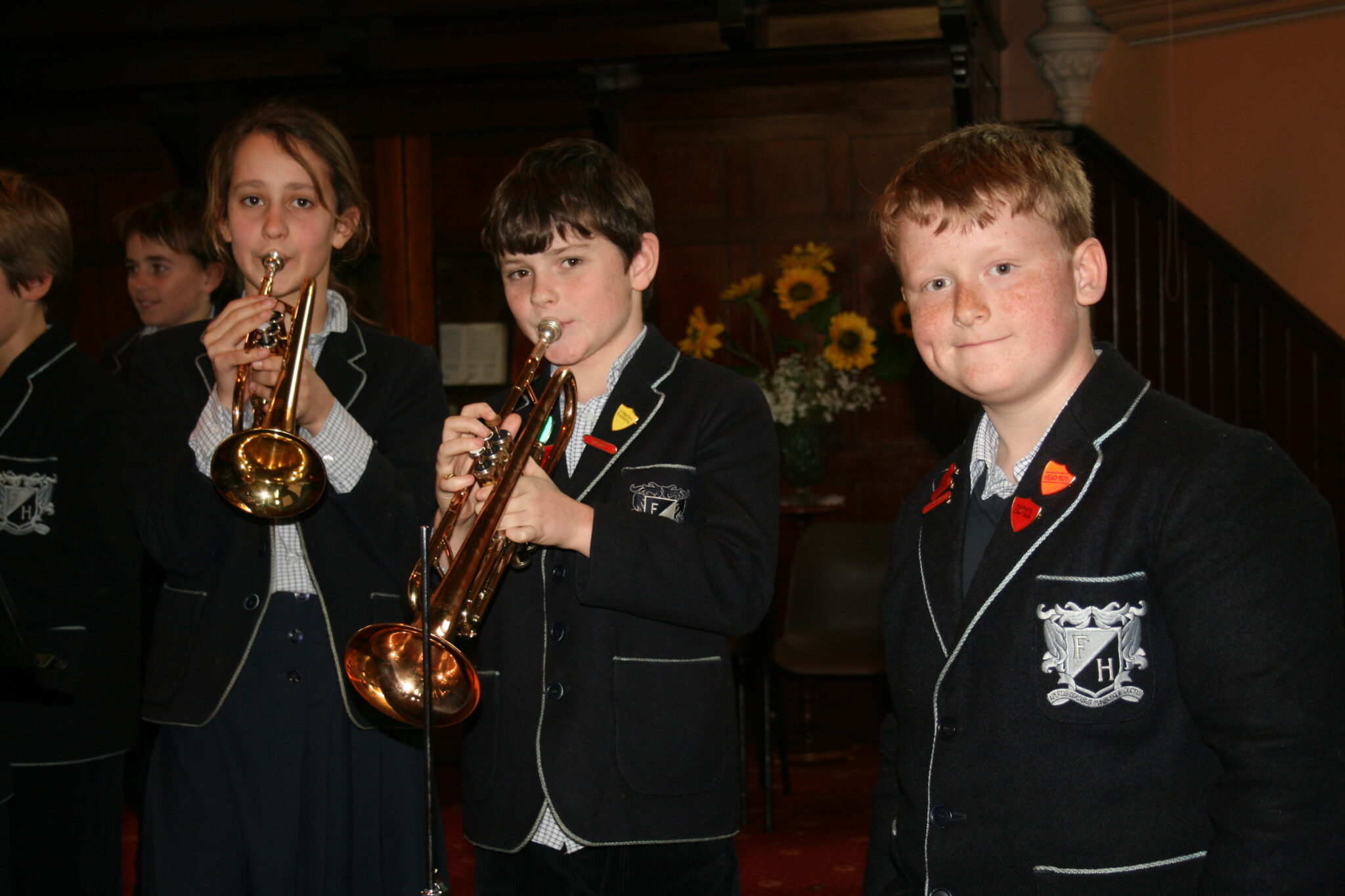
Music
The acquisition of musicianship and the development of core musical skills are the main aims of our music curriculum. An effective music curriculum sets out the sequences of learning in the following four key areas: singing, listening, composing and performing/instrumental performance. Pupils are engaged in creative music-making activities that include singing games, instrumental and ensemble learning, experimenting with creative processes such as composition, improvisation and listening to high quality music as well as the performances by their fellow pupils and teachers. In our school, music brings the community together through the shared endeavour of whole-school singing as well. All the above, we foster the development of musical ability and appreciation in later life.
In our music lessons there is the ambition that every young person will experience music and make progress! All pupils learn to play the recorder in Year 3 and the ukulele in Year 4. In Year 5, children explore music from around the world such as djembe/African drumming, Samba drumming and Gamelan music. In Year 6, pupils develop compositional skills through music technology and they have the opportunity to build their own composition portfolio on Soundtrap. Most pupils have individual lessons across a range of different instruments starting in Year 2. Year 1 pupils are also given the chance to start recorder, ukulele and piano lessons or to join the Y1 Violin Group.
Many opportunities are provided for children to enjoy music-making in ensembles such as the Wind & Brass Band and choirs such as weekly Pop Choir and Harmony Club. In addition to this, pupils explore song-writing during the Varied Music club, and develop their performing, drama and singing skills during our Musical Theatre club. Additionally, music technology clubs run after school twice a week, in partnership with M:Tech.
Children enjoy taking part in year group musical productions, and performing in groups and solos in concerts and assemblies throughout the year. Carol concerts and nativity productions take place at the end of the Autumn Term. Additionally, two music festivals take place during the Spring Term and Summer Term; the Instrumental Festival in the Spring Term, when instrumental learners get the chance to perform solo on stage, and the Summer Music Festival features music workshops, staff concerts, talks, etc. during a week of music making projects. At the same time, coffee morning concerts and whole class assemblies feature class music learning, singing and our instrumental ensembles.

Languages
Pupils are taught French from Reception to Year 6 by our Head of Languages, Madame Zoe. In addition, Year 6 pupils are introduced to Spanish and Latin in their final two terms at Finton. Throughout the school, language teaching focuses on building children’s innate curiosity about the world around them, preparing them for secondary school and equipping them to communicate with confidence in a foreign language.
There is a clear emphasis on enjoyment and participation. Children develop the four skills of speaking, listening, reading and writing, through the use of puppets, rhymes, songs, role-plays, traditional stories and interactive websites.
We enhance our language learning in many ways at Finton House: weekly language clubs take place for more able or bilingual pupils; theatre companies visit the school; Year 6 have a French Day; we have an International Day celebrating all of the cultures across the school and our Year 6 pupils go to Normandy for 5 days in their summer term, where they are fully immersed in French language, history and culture.

Maths
At Finton we aim to foster curiosity and enjoyment of mathematics and develop the children’s mathematical fluency, reasoning and ability to solve problems. Encouragement and the development of investigative thinking skills brings maths to life in the classroom and builds the children’s confidence.
Children excel where expectations are high and children at Finton consistently achieve to the best of their ability in Maths. Those that struggle are supported and nurtured, whilst those with a natural aptitude for mathematics are challenged to stretch their understanding through differentiated lessons and workshops.
Through engaging and practical lessons, we make mathematics interesting, creative and fun. We promote a growth mind-set attitude towards mathematics by encouraging children to take risks and make mistakes in order to deepen their knowledge. This way they learn that challenge can be rewarding and satisfying.

Music
The acquisition of musicianship and the development of core musical skills are the main aims of our music curriculum. An effective music curriculum sets out the sequences of learning in the following four key areas: singing, listening, composing and performing/instrumental performance. Pupils are engaged in creative music-making activities that include singing games, instrumental and ensemble learning, experimenting with creative processes such as composition, improvisation and listening to high quality music as well as the performances by their fellow pupils and teachers. In our school, music brings the community together through the shared endeavour of whole-school singing as well. All the above, we foster the development of musical ability and appreciation in later life.
In our music lessons there is the ambition that every young person will experience music and make progress! All pupils learn to play the recorder in Year 3 and the ukulele in Year 4. In Year 5, children explore music from around the world such as djembe/African drumming, Samba drumming and Gamelan music. In Year 6, pupils develop compositional skills through music technology and they have the opportunity to build their own composition portfolio on Soundtrap. Most pupils have individual lessons across a range of different instruments starting in Year 2. Year 1 pupils are also given the chance to start recorder, ukulele and piano lessons or to join the Y1 Violin Group.
Many opportunities are provided for children to enjoy music-making in ensembles such as the Wind & Brass Band and choirs such as weekly Pop Choir and Harmony Club. In addition to this, pupils explore song-writing during the Varied Music club, and develop their performing, drama and singing skills during our Musical Theatre club. Additionally, music technology clubs run after school twice a week, in partnership with M:Tech.
Children enjoy taking part in year group musical productions, and performing in groups and solos in concerts and assemblies throughout the year. Carol concerts and nativity productions take place at the end of the Autumn Term. Additionally, two music festivals take place during the Spring Term and Summer Term; the Instrumental Festival in the Spring Term, when instrumental learners get the chance to perform solo on stage, and the Summer Music Festival features music workshops, staff concerts, talks, etc. during a week of music making projects. At the same time, coffee morning concerts and whole class assemblies feature class music learning, singing and our instrumental ensembles.
Outdoor Learning
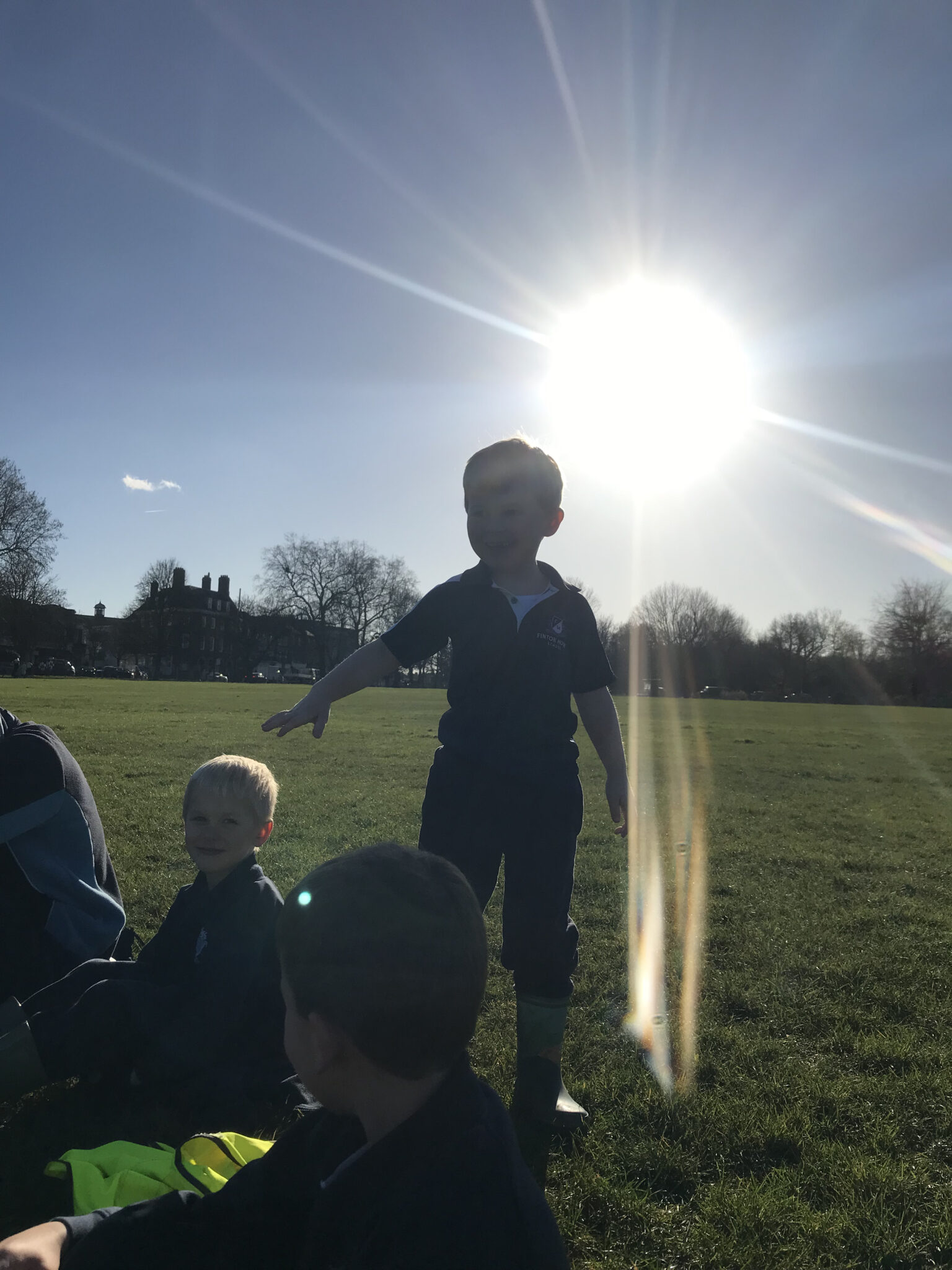
Outdoor Learning
Here at Finton House, we believe passionately in celebrating every child and their unique learning styles. As part of this ethos, we try to give the children a wide variety of learning opportunities. One of these is through learning in the great outdoors.
In the Lower School, Outdoor Learning is timetabled weekly and gives the children the chance to learn both on Wandsworth Common and at our local farm (“Tom’s Farm”) with which we have formed a partnership. During these sessions, children become confident preparing themselves to be outside in all weathers. Within the sessions, much of the learning focuses on the Finton Goals (developing teamwork, resilience and respect for nature) rather than the outcome of the planned activity. At Tom’s Farm, the children have the opportunity to meet a wide range of rare breeds and learn about the ‘Farm to Fork’ philosophy. One highlight for our Year 1 pupils is when they achieve their ‘wheelbarrow license’! Similarly, pupils also get involved in the slightly less glamorous farm tasks such as cleaning the yard which we believe to be character building – and (fingers crossed!) makes them realise that tidying their bedrooms really isn’t such an impossible task.
In the Upper School, our Outdoor Learning provision is delivered through fieldwork trips and residentials which range from 3-5 days depending on the age of the children. Our residential trips have previously involved visits to PGL, Bushcraft Camping at Penzhurst Place, and Rhos-y-Gwaliau Outdoor Education Centre. In the Upper School, children also have the opportunity to join our Farm Club, visiting Tom’s Farm weekly after school.
All children participate in our biennial Outdoor Learning Day which aims to provide new and memorable experiences for the children. Previous activities during this day have included caving, fire lighting and meeting miniature therapy pigs.
PSHEE
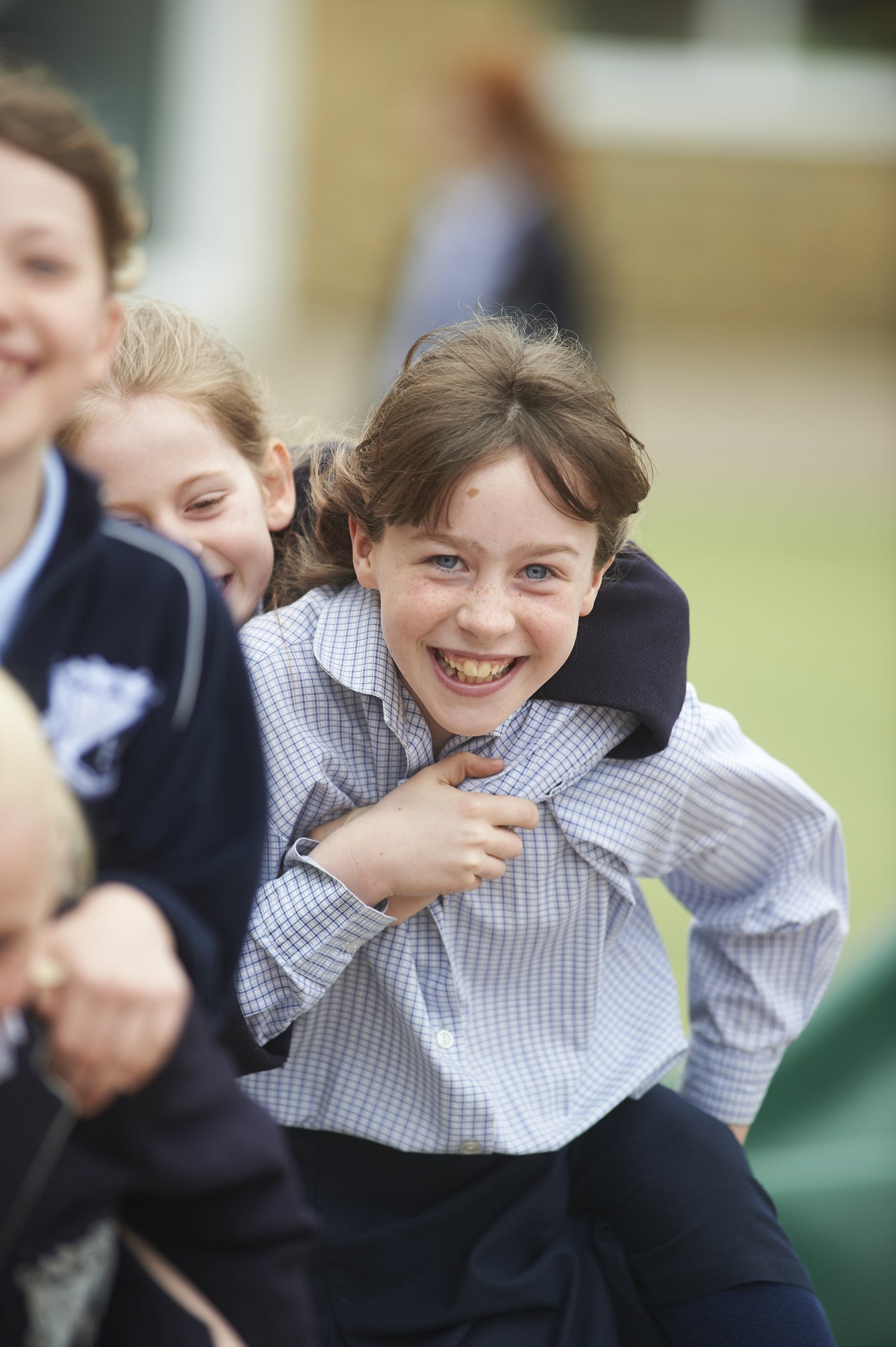
PSHEE
PSHEE education at Finton House is concerned with teaching the knowledge, skills and personal attributes that will equip our children to become engaged members of society in the 21st Century. Learning in PSHEE happens through a blend of explicit and cross-curricular objectives covering three distinct themes of health and wellbeing, relationships, and living in the wider world. These are taught alongside the Finton Goals which form the culture and ethos of our school. The distinct themes cover wide-ranging topics from global sustainability to administering first aid and managing money to mindfulness and mental wellbeing. The Finton Goals, taught through assemblies and embedded in pastoral guidance, enable each child to develop the values of self-belief, kindness, respect, communication, curiosity, resilience and morality.
PSHEE is essential to ensuring that children at Finton House School are effectively prepared for life in an increasingly global society.
Reasoning
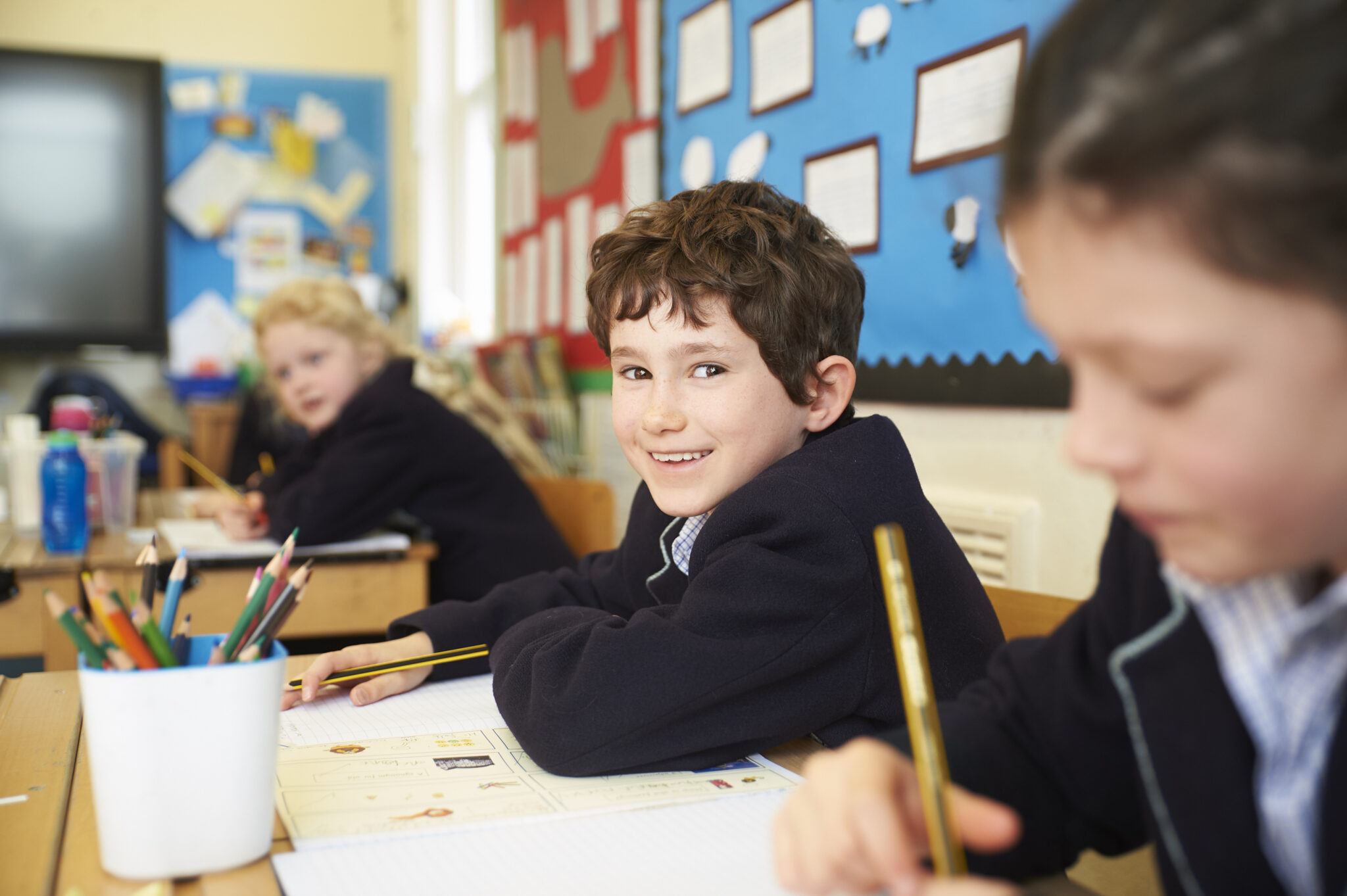
Reasoning
Reasoning is taught weekly at Finton as a subject from Year 4, when pupils are taught in small groups.
In Year 5, the curriculum time increases with two reasoning lesson each week and pupils are taught in differentiated small groups.
In Year 6, reasoning is taught as part of exam preparation throughout the Autumn Term. The focus of reasoning is bespoke and tailored to each child’s individual needs. Pupils work on applying their verbal, non-verbal and spatial skills to different styles of paper and assessments according to their 11+ entry requirements.
The focus of the non-verbal reasoning curriculum is to develop the skills needed to analyse visual information by identifying patterns, shapes, and sequences. Non-verbal reasoning is often linked to numerical skills which are also taught as part of our mathematics curriculum.
The verbal reasoning curriculum focuses on developing an understanding of and the ability to manipulate verbal information. Our pupils are taught to think logically about language and have the confidence to recognise different types of vocabulary and their contextual meanings. Verbal reasoning forms part of our English curriculum is developed through reading widely and regularly.

Outdoor Learning
Here at Finton House, we believe passionately in celebrating every child and their unique learning styles. As part of this ethos, we try to give the children a wide variety of learning opportunities. One of these is through learning in the great outdoors.
In the Lower School, Outdoor Learning is timetabled weekly and gives the children the chance to learn both on Wandsworth Common and at our local farm (“Tom’s Farm”) with which we have formed a partnership. During these sessions, children become confident preparing themselves to be outside in all weathers. Within the sessions, much of the learning focuses on the Finton Goals (developing teamwork, resilience and respect for nature) rather than the outcome of the planned activity. At Tom’s Farm, the children have the opportunity to meet a wide range of rare breeds and learn about the ‘Farm to Fork’ philosophy. One highlight for our Year 1 pupils is when they achieve their ‘wheelbarrow license’! Similarly, pupils also get involved in the slightly less glamorous farm tasks such as cleaning the yard which we believe to be character building – and (fingers crossed!) makes them realise that tidying their bedrooms really isn’t such an impossible task.
In the Upper School, our Outdoor Learning provision is delivered through fieldwork trips and residentials which range from 3-5 days depending on the age of the children. Our residential trips have previously involved visits to PGL, Bushcraft Camping at Penzhurst Place, and Rhos-y-Gwaliau Outdoor Education Centre. In the Upper School, children also have the opportunity to join our Farm Club, visiting Tom’s Farm weekly after school.
All children participate in our biennial Outdoor Learning Day which aims to provide new and memorable experiences for the children. Previous activities during this day have included caving, fire lighting and meeting miniature therapy pigs.

PSHEE
PSHEE education at Finton House is concerned with teaching the knowledge, skills and personal attributes that will equip our children to become engaged members of society in the 21st Century. Learning in PSHEE happens through a blend of explicit and cross-curricular objectives covering three distinct themes of health and wellbeing, relationships, and living in the wider world. These are taught alongside the Finton Goals which form the culture and ethos of our school. The distinct themes cover wide-ranging topics from global sustainability to administering first aid and managing money to mindfulness and mental wellbeing. The Finton Goals, taught through assemblies and embedded in pastoral guidance, enable each child to develop the values of self-belief, kindness, respect, communication, curiosity, resilience and morality.
PSHEE is essential to ensuring that children at Finton House School are effectively prepared for life in an increasingly global society.

Reasoning
Reasoning is taught weekly at Finton as a subject from Year 4, when pupils are taught in small groups.
In Year 5, the curriculum time increases with two reasoning lesson each week and pupils are taught in differentiated small groups.
In Year 6, reasoning is taught as part of exam preparation throughout the Autumn Term. The focus of reasoning is bespoke and tailored to each child’s individual needs. Pupils work on applying their verbal, non-verbal and spatial skills to different styles of paper and assessments according to their 11+ entry requirements.
The focus of the non-verbal reasoning curriculum is to develop the skills needed to analyse visual information by identifying patterns, shapes, and sequences. Non-verbal reasoning is often linked to numerical skills which are also taught as part of our mathematics curriculum.
The verbal reasoning curriculum focuses on developing an understanding of and the ability to manipulate verbal information. Our pupils are taught to think logically about language and have the confidence to recognise different types of vocabulary and their contextual meanings. Verbal reasoning forms part of our English curriculum is developed through reading widely and regularly.
RSE
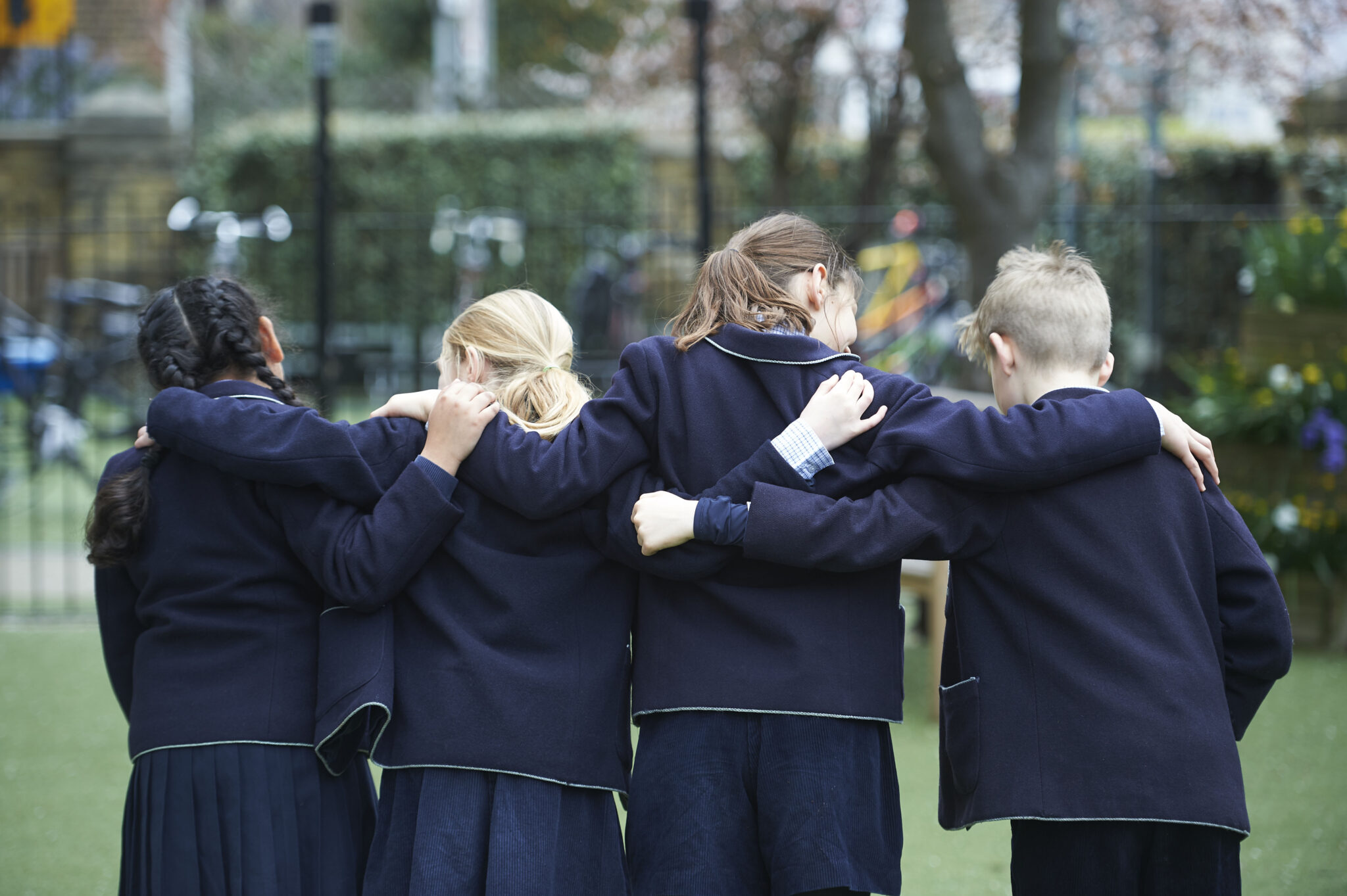
RSE
RSE (Relationship and Sex Education) at Finton is concerned with talking, listening, and thinking about feelings and relationships. It is also about promoting mental wellbeing. RSE at Finton helps pupils to develop skills to make and maintain positive relationships, develop positive attitudes and values and respect differences in opinion. RSE at Finton has a thread that runs through the whole school so pupils know how their bodies work, age appropriately from Reception to Year 6. One important aspect of RSE at Finton is that pupils learn how to protect themselves and know where to go for help and support.
Religious Education
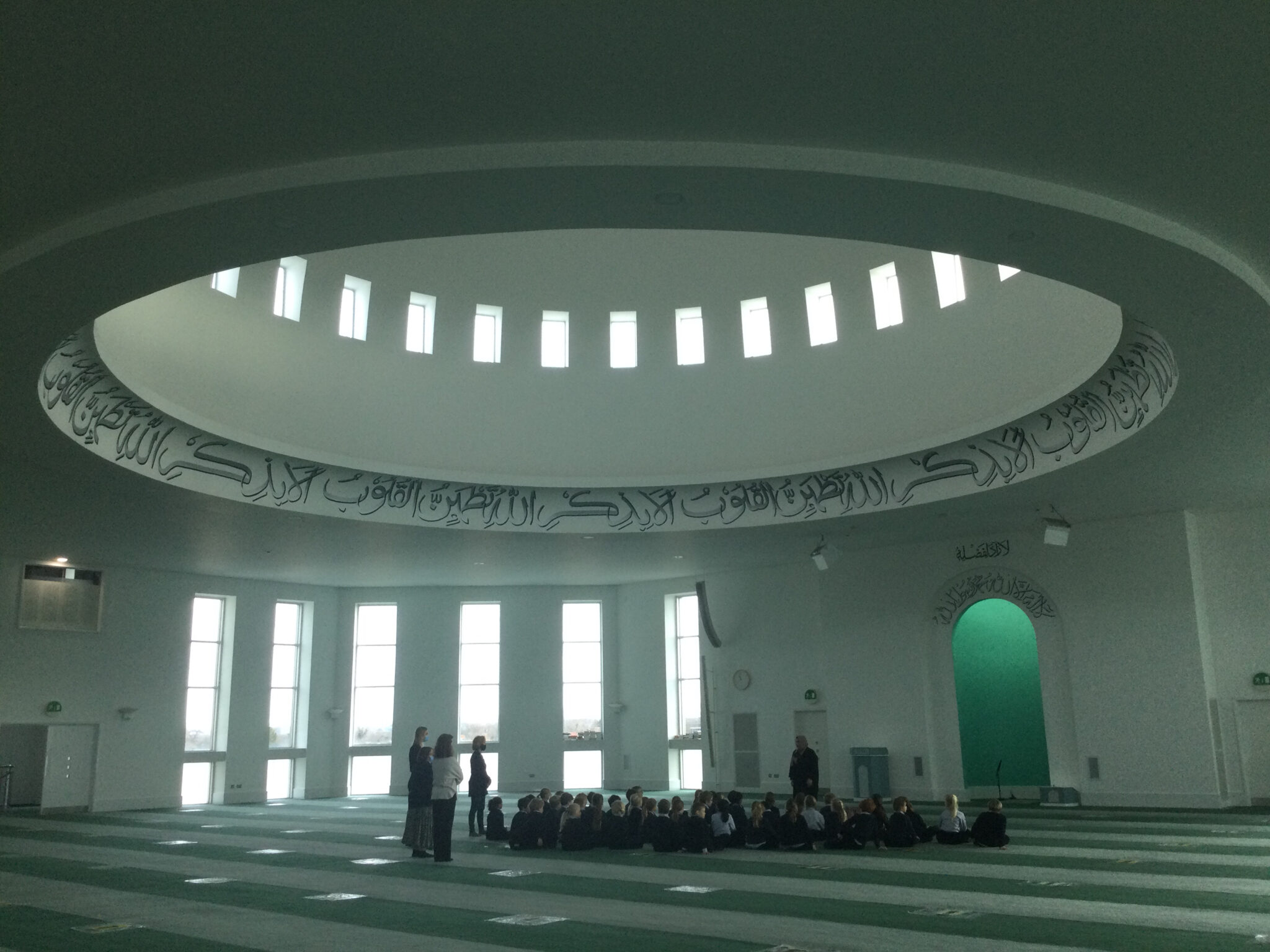
Religious Education
Finton House pupils learn about major religions around the world, and that in the context of being free to hold beliefs of our own, we have a responsibility to show compassion and tolerance for others.
Religious Education gives valuable opportunities for children to ask questions, explore ideas, and discuss difficult topics in a supportive environment. Awareness of right and wrong is vital and children are encouraged to reflect on their own actions. Tenets that run through all faiths are recognised, such as the golden rule of treating others as we would like to be treated ourselves.
Finton families of all religions are encouraged to share their knowledge and experience in assemblies and class talks. Children find out about religions and festivals celebrated in our neighbourhood, especially enjoying opportunities to try delicious food and hear wonderful stories.
Children visit a synagogue, our parish church of St Mary Magdalene, a mosque, the Hindu temple at Neasden, the Buddhapadipa temple in Wimbledon and Tooting Gurdwara to gain deeper insight into aspects of worship and prayer.
All learn to have respect for those with (and without) faith, consequently furthering their understanding of the world and their own place within it.
Science
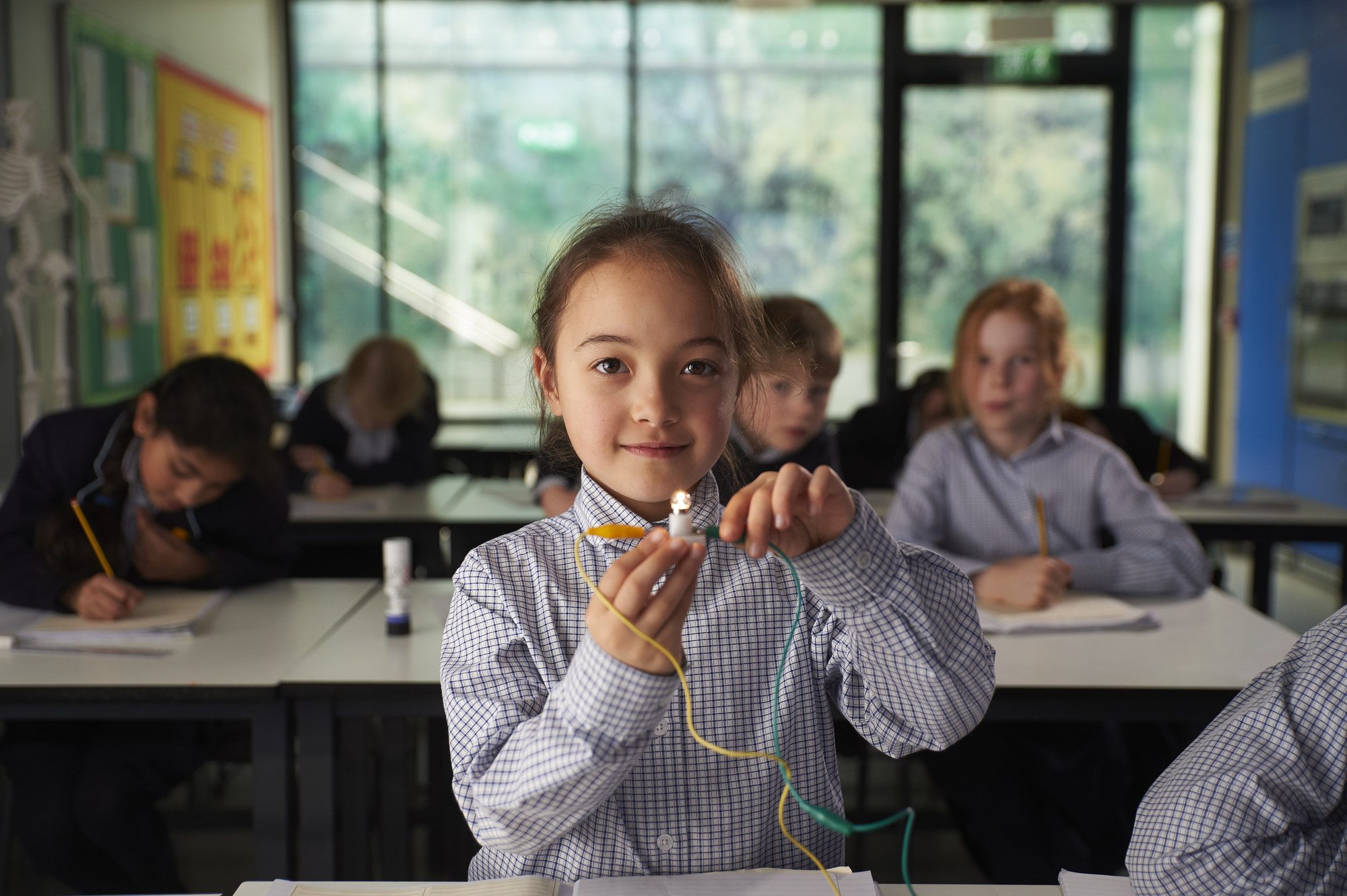
Science
At Finton House we aim to nurture children’s natural curiosity about the world around them. We offer a broad and balanced Science curriculum that encourages systematic study through observation, investigation and experiment.
We are very fortunate to have a fully equipped Science laboratory that enables children to explore many areas of science in a controlled environment: from physics topics such as forces through to chemical changes. Fieldwork is encouraged and classes can often be found exploring natural habitats or investigating weather in the local area.
Links are forged with schools, museums, parks and other outside agencies to provide exciting opportunities for all our budding young scientists to shine. Our more able scientists regularly attend science workshops held outside of school, and our own staff are involved in putting on a STEM (Science Technology Engineering and Maths) day each year at Finton.

RSE
RSE (Relationship and Sex Education) at Finton is concerned with talking, listening, and thinking about feelings and relationships. It is also about promoting mental wellbeing. RSE at Finton helps pupils to develop skills to make and maintain positive relationships, develop positive attitudes and values and respect differences in opinion. RSE at Finton has a thread that runs through the whole school so pupils know how their bodies work, age appropriately from Reception to Year 6. One important aspect of RSE at Finton is that pupils learn how to protect themselves and know where to go for help and support.

Religious Education
Finton House pupils learn about major religions around the world, and that in the context of being free to hold beliefs of our own, we have a responsibility to show compassion and tolerance for others.
Religious Education gives valuable opportunities for children to ask questions, explore ideas, and discuss difficult topics in a supportive environment. Awareness of right and wrong is vital and children are encouraged to reflect on their own actions. Tenets that run through all faiths are recognised, such as the golden rule of treating others as we would like to be treated ourselves.
Finton families of all religions are encouraged to share their knowledge and experience in assemblies and class talks. Children find out about religions and festivals celebrated in our neighbourhood, especially enjoying opportunities to try delicious food and hear wonderful stories.
Children visit a synagogue, our parish church of St Mary Magdalene, a mosque, the Hindu temple at Neasden, the Buddhapadipa temple in Wimbledon and Tooting Gurdwara to gain deeper insight into aspects of worship and prayer.
All learn to have respect for those with (and without) faith, consequently furthering their understanding of the world and their own place within it.

Science
At Finton House we aim to nurture children’s natural curiosity about the world around them. We offer a broad and balanced Science curriculum that encourages systematic study through observation, investigation and experiment.
We are very fortunate to have a fully equipped Science laboratory that enables children to explore many areas of science in a controlled environment: from physics topics such as forces through to chemical changes. Fieldwork is encouraged and classes can often be found exploring natural habitats or investigating weather in the local area.
Links are forged with schools, museums, parks and other outside agencies to provide exciting opportunities for all our budding young scientists to shine. Our more able scientists regularly attend science workshops held outside of school, and our own staff are involved in putting on a STEM (Science Technology Engineering and Maths) day each year at Finton.
